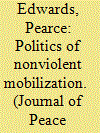| Srl | Item |
| 1 |
ID:
189962


|
|
|
|
|
| Summary/Abstract |
What is the relationship between domestic terrorism and voting behavior? Past research notes the prevalence of domestic terrorist attacks in democratic regimes, but focuses primarily on such violence as a “weapon of the weak.” We extend this literature by focusing on terrorism by incumbent-aligned armed groups and argue these actors use selective violence against political elites to delegitimize the political opposition and provide credible signals of the instability and unrest that is likely to accompany a transfer of power. Using data from two Argentine presidential elections in 1973, we evaluate the relationship between incidents of violence and changes in two measures of voting behavior—vote share and turnout. Consistent with expectations, left-wing political violence between elections reduced right-wing vote share but did not reduce turnout. Additional tests support the mechanism that violence increased voters’ doubts about a potential right-wing government’s ability to govern, and show violence is correlated with future repression.
|
|
|
|
|
|
|
|
|
|
|
|
|
|
|
|
| 2 |
ID:
188688


|
|
|
|
|
| Summary/Abstract |
Authoritarian regimes repress to prevent mass resistance to their rule. In doing so, regimes’ security forces require information about the dissidents who mobilize such resistance. Political competition, which fuels partisan rivalries, offers one solution to this problem by motivating civilians to provide needed information to security forces. Yet civilians share information about any political opponents, not just dissidents, which creates a challenge for regimes that want to target dissidents. Drawing on novel archival data from the immediate aftermath of the 1973 coup that brought Augusto Pinochet to power in Chile, a period that included civilian collaboration with repression, this article presents evidence that close pre-coup political competition is associated with more frequent repression and more targeting of non-dissidents. The author uses pre-coup democratic elections to measure political competition and addresses the challenge of estimating political preferences unaffected by repression. Qualitative evidence and further quantitative tests probe implications of the partisan rivalry mechanism and account for alternative explanations.
|
|
|
|
|
|
|
|
|
|
|
|
|
|
|
|
| 3 |
ID:
182664


|
|
|
|
|
| Summary/Abstract |
Nonviolent resistance is considered one of the most effective methods of bringing about political change. Yet empirical research on how nonviolent campaigns emerge is limited. This article considers two sets of considerations which influence the strategic decision of a campaign to use nonviolent or violent methods: interactions with the state and campaign resources. Campaigns are concerned about the risk of repression from the state and are more likely to choose nonviolence when they believe the state will accommodate their demands. Open political competition signals likely accommodation. Campaigns’ nonviolent tactics are more effective when they possess social movement resources, though high levels of movement resources threaten the state. The argument implies political competition and social movement resources are associated with a higher likelihood of a campaign using nonviolence, though the relationship with social movement resources diminishes at high levels. Implications of the argument are tested on a sample of contentious campaigns from 1945 to 2006. Political competition and social movement resources are related as expected to the use of nonviolence. However, an extension shows these factors do not account for the advantage of nonviolent methods, particularly in triggering backlash protests, once a campaign is under way. An original ordinal measurement strategy for campaign methods suggests the intensity of violence and nonviolence are likewise unrelated to competition and resources.
|
|
|
|
|
|
|
|
|
|
|
|
|
|
|
|
| 4 |
ID:
178209


|
|
|
|
|
| Summary/Abstract |
Do human rights organizations (HROs) aid the consolidation of democracy in post-authoritarian states? It is often argued that these groups contribute to accountability for past repression. Yet HROs can have unintended consequences if they threaten the interests of powerful domestic institutions. This paper develops a simple model of human rights activism in post-authoritarian states. Civilian governments in these states trade off support from the military and human rights activists which seek to punish the military. Counterintuitively, the model predicts human rights activists make amnesty for the military more likely, as activists tempt the government to punish the military and the military becomes more likely to intervene in politics. The model’s implications are tested using a sample of post-authoritarian states from 1970-2010. Results show that more HRO influence increases the likelihood of amnesty laws and military involvement in government, though HROs may achieve justice through pathways such as truth commissions.
|
|
|
|
|
|
|
|
|
|
|
|
|
|
|
|